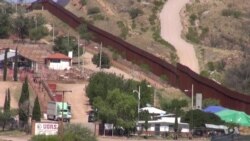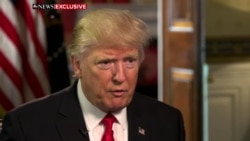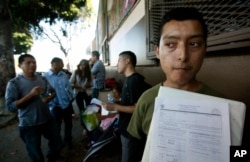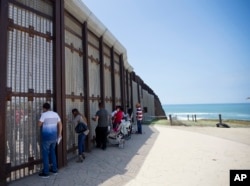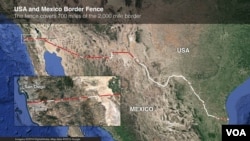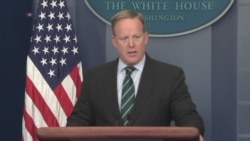President Donald Trump Wednesday ordered construction of a wall along the country's southern border with Mexico to thwart illegal migration while threatening to pull some funds from hundreds of so-called U.S. sanctuary cities.
Trump signed the immigration executive orders as he visited the Department of Homeland Security, the federal agency charged with protecting the U.S. border.
"We are in the middle of a crisis on our southern border. The unprecedented surge of illegal migrants from Central America is harming both Mexico and the United States," he said. "And I believe the steps we will take, starting right now, will improve the safety in both of our countries. It is going to be very, very good for Mexico."
The orders served as an exclamation point to one of the major forces behind Trump's lengthy run to a four-year term in the White House -- his contention that illegal migrants in the U.S. threaten its security and cost American workers their jobs. At rally after rally during his campaign, his most fervent cheering supporters shouted, "Build that wall!"
Trump told ABC News that construction of the wall would start within months and continued to contend that Mexico would pay for it, although Mexico has repeatedly said it would not.
WATCH: Trump on American reimbursement for border wall
Payment plan
Trump said the payment would perhaps be in a "complicated form," signaling it would not be a direct payment from Mexico City to Washington.
The Washington Post newspaper says money raised by a possible tax on Mexican imports could be used to pay for it.
Republican House Speaker Paul Ryan of Wisconsin praised the actions in a statement.
"This is about keeping Americans safe. We are committed to working with the administration to stop the influx of illegal immigration along the southern border, protect our homeland, and uphold the rule of law. I applaud President Trump for keeping his promise to make this a national priority," Ryan said.
The executive order was not applauded by some, however. Democratic Senator Robert Menendez of New Jersey condemned it in strong terms.
“This is a terrible and ugly decision by a president who is more concerned with right-wing fringe movements than doing what’s right for all of America, for the economy, and for the future of this country," Menendez said. "Donald Trump started his campaign by calling Mexicans rapists and murderers, and he is shamefully starting his presidency by declaring open season on immigrants and refugees, and making taxpayers foot the bill for his nativist impulses."
'Hostile act'
A senator from the Mexican opposition, Armando Rios Piter, calls the wall a "hostile act" toward the Mexican people. He is urging President Enrique Pena Nieto to cancel next week's meeting with Trump.
Late Wednesday, Pena Nieto said he "regrets and dispproves" of Trump's push to build a wall. He also said he "considering" cancelling next week's visit to Washington.
White House spokesman Sean Spicer said the U.S. would build more detention facilities along the border to house migrants who cross into the U.S. and then give them a "one-way ticket back to the country of their origin."
Spicer said the Trump administration would end what he called the "dangerous catch and release program" border agents currently employ. Migrants are let go after promising to appear in court. Many of them ignore the promise.
Officials say Trump is also considering a four-month freeze on all refugee admissions into the U.S., as well as a ban for at least 30 days for entry to the U.S. by anyone from Iraq, Iran, Libya, Syria, Somalia, Sudan and Yemen — all Muslim majority countries.
The ban could also include an exception for people who are religious minorities in their country and facing persecution.
The office of the U.N. High Commissioner for Refugees said it was aware of the U.S.-Mexican border issue and would "closely follow the impact" of any wall-building program on people seeking refuge in the United States.
"At a time of enormous needs for the protection of refugees," a UNHCR statement said, "we hope that the U.S. will continue its strong leadership role and long tradition of protecting those who are fleeing conflict and persecution."
National security
Trump often used his campaign rallies to criticize U.S. admissions of refugees, employing the phrase, "We have no idea who these people are." He also initially proposed a ban on admitting people from Muslim countries, drawing sharp criticism. He later amended his stance to include countries with links to terrorism.
He wants a wall along the entire 3,200-kilometer length of the U.S.-Mexico border. Currently, there is a barrier only along some of the border. U.S. agents patrol the border in vehicles, and monitor it with unmanned drones and infrared video.
Trump said Congress would initially authorize the U.S. government to pick up the cost — possibly $10 billion or more — and be reimbursed later by the Mexican government.
Trump has said building the wall would be easy. But experts say they doubt it noting the rough terrain along the border, with regular peaks and valleys. Some of the property along the border is owned privately and the owners say they do not want a wall.
Congressman Bennie Thompson, the ranking Democratic member of the House Homeland Security committee, said the executive order on the U.S.-Mexico border wall "is nothing more than political theater."
Thompson said the wall will do little to make America's borders safer.
"The Department of Homeland Security already has the authority to build border fence where there is operational need. Wasting billions on a wall will do nothing to address the thousands of people arriving at our borders, not trying to circumvent the existing fence or evade Border Patrol agents. It will do nothing to address those who come here legally, but overstay their visas," he said.
Trump's plan to put the $10 billion or more cost of the "wall on the American taxpayers' credit card," violates his campaign promise that American taxpayers would not pay for it, Thompson said. "Mexico has absolutely no intention of paying for it," he added.
Residents situated along the southern border hold opposing views, much like the rest of the country. But even among President Trump’s supporters, some doubt the wall’s construction will amount to his promises.
“It will never be a complete wall, because of the nondomestic animals that are native to this area,” said Stuart Dilly, a gas station employee 2 kilometers north of the California border. “He might find a way to get around it, but we’ll see. I don’t foresee the wall being any higher than it already is.”
Jairo Carcamo, who crossed the border himself at 15 -- seeking refuge from Honduras -- isn’t opposed to the wall as a deterrent to drug dealers and “bad people,” but offers an alternative solution.
“Something good [Trump] can do is he can hire more border patrol, right there he’s creating more jobs,” Carcamo said.
But other locals consider Trump’s plans detrimental to a border population of diverse heritage.
Los Angeles-native Leslie Ambriz, a volunteer at the humanitarian nonprofit organzation Border Angels, joined a group along the California desert to place jugs of water for crossing migrants. She says a wall’s central purpose is to create a division of people.
“It says we’re better than you,” Ambriz said, "and I don’t think that’s how people are supposed to be treated.”
Sanctuary Cities
In addition, Trump targeted several hundred U.S. cities that by law or their political decisions have declared themselves "sanctuary cities," with police refusing to help federal agents identify undocumented immigrants so they could be detained and eventually deported.
Spicer said the new president will attempt to block federal funding to the cities that show "disregard for our laws." The cities individually could lose millions of dollars in federal aid. Many of the cities, including some of the biggest in the country, are located in states that Trump won in the November election.
Democratic House Minority leader Nancy Pelosi of California blasted both of Trump's executive orders.
“With today’s sweeping and constitutionally suspect executive actions, the president is turning his back on both our history and our values as a proud nation of immigrants," Pelosi said. "Wasting billions of taxpayer dollars on a border wall Mexico will never pay for, and punishing cities that do not want their local police forces forced to serve as President Trump’s deportation dragnet does nothing to fix our immigration system or keep Americans safe."
Pelosi represents San Francisco, which is a sanctuary city.
Even with Trump's immigration decrees, the new administration is grappling with how to deal with former President Barack Obama's order allowing immigrant children who entered the U.S. illegally when their parents crossed the border to stay in the U.S. for two years without fear of deportation. Many of the children only know the U.S. as their home and now are students or working in the country.
Immigration hardliners want these children deported, along with their parents, but their supporters call them "Dreamers" and have advocated for allowing them to stay in the U.S.
Spicer said Trump officials would review the cases of the undocumented children "in a humane way."
WATCH: Spicer on immigration officers, sanctuary cities
Targeting criminals
Obama said his priority was to protect Americans, while also working to help immigrants who had been pushed from their homes by war, terrorism and political instability.
The Obama administration said refugees are "the most thoroughly screened travelers" to the United States, and are required to undergo security checks, including strict vetting by law enforcement and intelligence agencies, and extensive interviews before they are allowed into the country. For many refugees, the process takes up to two years to complete.
In 2016, the U.S. admitted about 85,000 refugees, including more than 12,500 Syrians. Obama set a goal for the 2017 fiscal year, which began in October, of 110,000 refugee admissions.
VOA's Cindy Saine at the White House and reporters Victoria Macchi, Ken Bredemeier, Jeff Seldin, Ramon Taylor and Margaret Besheer contributed to this report.




